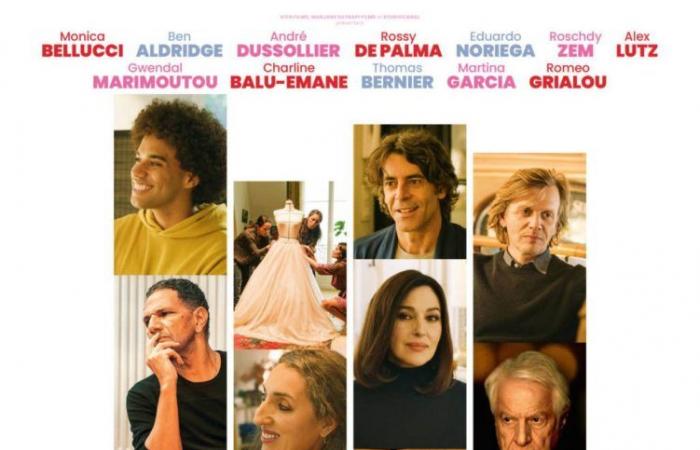
Paradise Paris // By Marjane Satrapi. With Monica Bellucci, Charline Balu-Emane and Rossy de Palma.
The movie Paradise Paris by Marjane Satrapi, although with good intentions, left me wanting more. Having appreciated the director’s previous works, such as Persepolis or The VoicesI expected to find this touch of humor, sensitivity and finesse which characterized his past creations. Unfortunately, the film lacks authenticity and struggles to deliver a clear message, making it a disappointing experience. First of all, Paradise Paris presents itself as an ensemble film, with a multitude of characters from various backgrounds and nationalities. Through these figures, Satrapi seeks to explore the universal themes of life, death and love, while paying homage to Paris, the City of Lights. However, from the first minutes, the tone appears too written, too calculated. The film strings together scenes that seem to have been developed with excessive rigor, which prevents emotions from flowing naturally.
Ex-opera star, Giovanna fumes: while she was declared dead by mistake, the press tributes are slow in coming. Can Mike, an English stuntman, decently tremble in the face of death when he defies it every day? Smoking kills, but Dolores doesn’t care: on her granddaughter’s 15th birthday, she unilaterally makes a pact with God. While trying to commit suicide, Marie-Cerise, a harassed, humiliated and depressed teenager, is kidnapped and will naturally make her kidnapper her shrink. Edouard, although he has been presenting a famous crime show on TV for years, feels the blow when his mortality is reminded of him.
At every moment, we feel that the scenario is forcing the situations, making the whole thing artificial and disjointed. This lack of spontaneity in the story also harms character development. Each of them seems trapped in a stereotypical role, without real depth or development. Whether it is Monica Bellucci, André Dussollier or the other members of the cast, their performances fail to transcend the limits imposed by an overly rigid script. Bellucci, in particular, struggles to convince in a role which, however, could have offered him a field of expression rich in nuances. As for Dussollier, his playing sometimes seems too mechanical, lacking the emotion necessary to captivate the spectator. This gives the impression that the cast, although talented, is used as simple pawns in a shaky production. Another point that caught my attention is the absence of cultural diversity in a film that aims to be cosmopolitan. Marjane Satrapi, of Iranian origin, had a unique opportunity to present a multicultural Paris, open to the world.
However, the diversity on screen essentially comes down to French-speaking characters, mainly European and Christian. This narrow vision of the city contrasts with the image that one might expect of a metropolis as rich and varied as Paris. The omission of cultures that are very present in the capital, particularly those linked to Islam or Africa, leaves a taste of unfinished business. Furthermore, the film attempts to play on the opposition between life and death to instill a positive philosophy. “Being around death to appreciate life” is one of the central messages that Satrapi wishes to convey. However, this idea, while laudable, is treated in a superficial and repetitive manner, without ever really hitting its target. Instead of creating a deep reflection on these themes, the film ends up brushing over them, leaving the viewer perplexed as to the true point of the work. This feeling of confusion is reinforced by the structure of the film, which multiplies the stories without ever connecting them in a coherent manner. Each character seems to evolve in their own universe, without their destinies converging in any significant way.
This creates a kind of fragmentation that makes it difficult to understand the whole. In addition, the introduction of new characters as the film progresses ends up drowning out the main plots, giving an impression of narrative overload. Despite everything, it would be unfair to say that *Paradis Paris* is a totally failed film. Certain sequences, notably thanks to the intervention of actress Rossy De Palma, manage to capture a moment of grace. De Palma, with his natural charisma, brings a touch of humanity and authenticity to a film which is otherwise sorely lacking. These few successful moments give a glimpse of what the film could have been if it had focused more on spontaneity and simplicity. In conclusion, Paradise Paris is a film which, by wanting to say and do too much, ends up no longer telling anything important. Marjane Satrapi, once recognized for her humor and her ability to hit the right note, seems here to have lost her verve. The result is a work that is too written, too calculated, which fails to move or captivate.
Although the casting is attractive, the actors remain prisoners of poorly constructed characters, and the message of the film, although it carries great ideas, is lost in clumsy execution. A film that we will probably forget as quickly as we saw it, which is all the more disappointing given the expectations placed on Satrapi after its past successes.
Note : 2/10. In short, Marjane Satrapi fails to tell anything outside of a few successful scenes and an attractive cast.
Released on June 12, 2024 in cinemas – Available on VOD





